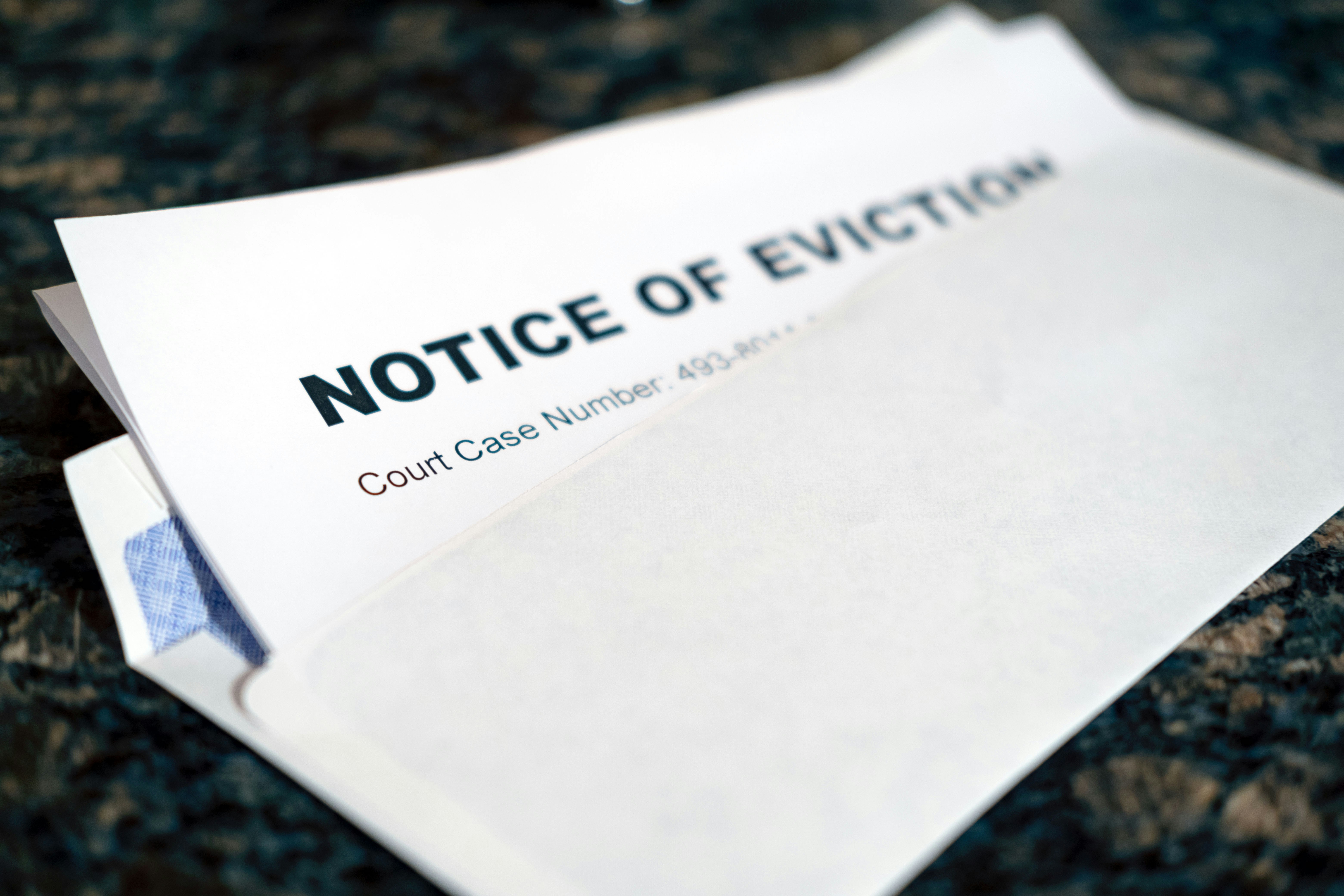
Kudos has partnered with CardRatings and Red Ventures for our coverage of credit card products. Kudos, CardRatings, and Red Ventures may receive a commission from card issuers. Kudos may receive commission from card issuers. Some of the card offers that appear on Kudos are from advertisers and may impact how and where card products appear on the site. Kudos tries to include as many card companies and offers as we are aware of, including offers from issuers that don't pay us, but we may not cover all card companies or all available card offers. You don't have to use our links, but we're grateful when you do!
Does an Eviction Affect Your Credit Score?
July 1, 2025


Quick Answers
An eviction proceeding itself is not reported to the three major credit bureaus—Equifax, Experian, and TransUnion—and will not directly affect your credit score.
If the eviction results in unpaid debt, such as past-due rent or fees, your landlord can send the account to a collection agency, which will appear on your credit report and can significantly lower your score.
A court judgment related to the eviction is a public record that, while no longer part of standard credit reports, can be found by future landlords and lenders through separate background checks, impacting your ability to secure housing or credit.
What Is an Eviction?
An eviction is the formal legal process a landlord must follow to remove a tenant from a rental property. This action is typically initiated when a tenant breaches the terms of their lease, such as through non-payment of rent or causing significant property damage. The process is strictly regulated by law and requires a landlord to secure a court order before they can lawfully retake possession of the unit.
While the eviction judgment itself is a public record, it does not directly appear on your traditional credit reports from Equifax, Experian, or TransUnion. However, if the eviction resulted from unpaid rent, the landlord may turn the debt over to a collection agency. This collection account can then be reported to the credit bureaus, which would lower your credit score.
How an Eviction Could Affect Your Credit Score
While an eviction itself doesn't appear on your credit report, the financial consequences that lead to it can. Here is how an eviction proceeding can ultimately damage your credit score.
- Unpaid Rent Goes to Collections: If you have an outstanding balance for rent or damages, your landlord can sell that debt to a collection agency. The agency will then report the delinquency to the major credit bureaus.
- A Lawsuit is Filed: Your landlord may sue you in civil court to recover the money you owe. If the court rules in their favor, a civil judgment is issued against you.
- Your Credit Score Drops: A collection account or a civil judgment on your record is a major red flag to lenders. Either of these events will cause a significant and immediate drop in your credit score.
- The Mark Remains for Years: Negative information like collections and judgments can legally stay on your credit report for up to seven years, making it difficult to secure loans, credit cards, or mortgages long after the eviction.
How Much Will an Eviction Affect Your Credit Score?
While an eviction itself does not appear on your credit report, the financial fallout from it can significantly harm your score. The extent of the damage depends on a few key factors.
- Unpaid Debt in Collections: The primary damage stems from unpaid rent or fees being sent to a collection agency. This new negative mark can cause your credit score to drop by a significant number of points.
- Starting Credit Score: The number of points you lose depends on your score before the collection account is added. A person with a higher credit score will typically experience a more substantial point drop from the new debt.
How You Can Avoid an Eviction Affecting Your Credit Score
Communicate with Your Landlord
Proactively discussing your financial situation with your landlord can lead to a mutually agreeable payment plan. This negotiation can prevent them from seeking a court judgment or sending unpaid rent to a collection agency, which are the primary actions that ultimately damage your credit score.
Explore Rental Assistance Programs
Many local governments and nonprofit organizations offer emergency rental assistance. Securing these funds can help you pay off outstanding rent and associated fees, satisfying your debt with the landlord and stopping any potential negative reports from being sent to credit bureaus or collection agencies.
Ways to Improve Your Credit Score
No matter your current standing, it is always possible to improve your credit score with consistent effort and positive financial habits. A better score is crucial for your overall financial health, as it can unlock better loan terms and credit card approvals.
- Monitor Your Credit Reports: Regularly check your reports from all three major bureaus—Experian, TransUnion, and Equifax—to identify and dispute any inaccuracies. You are entitled to free reports that can help you track your progress and spot potential fraud.
- Establish Automatic Bill Payments: Your payment history is the most significant factor influencing your score. Setting up automatic payments is a simple way to ensure you never miss a due date.
- Reduce Your Credit Utilization Ratio: Aim to keep your credit utilization below 30% of your total available credit. You can do this by paying down balances or requesting a credit limit increase on an existing account.
- Become an Authorized User: Ask a trusted family member or friend with a strong credit history to add you as an authorized user on one of their accounts. Their positive payment history and low utilization can help boost your score.
- Diversify Your Credit Mix: Lenders prefer to see that you can manage different types of credit responsibly. A healthy mix includes both revolving credit, like credit cards, and installment loans, such as auto or personal loans.
- Limit Hard Inquiries: Applying for too many new credit accounts in a short period can temporarily lower your score. Space out your applications and use prequalification tools to shop for rates without impacting your credit.
The Bottom Line
While an eviction itself won't appear on your credit report, any resulting collection accounts for unpaid rent or court-ordered judgments will negatively affect your credit score.
Frequently Asked Questions
Can an eviction directly appear on my credit report?
No, the eviction filing or judgment itself is not reported to credit bureaus. However, associated debts, like unpaid rent sent to collections, will appear.
How long will an eviction-related collection account affect my credit?
A collection account from unpaid rent or damages can remain on your credit report for up to seven years, negatively impacting your score during that time.
Will paying off the debt from an eviction remove it from my credit report?
Paying the collection won't remove it, but the account will be updated to "paid." This is viewed more favorably by future landlords and lenders.

Supercharge Your Credit Cards
Experience smarter spending with Kudos and unlock more from your credit cards. Earn $20.00 when you sign up for Kudos with "GET20" and make an eligible Kudos Boost purchase.
Editorial Disclosure: Opinions expressed here are those of Kudos alone, not those of any bank, credit card issuer, hotel, airline, or other entity. This content has not been reviewed, approved or otherwise endorsed by any of the entities included within the post.




















.webp)
.webp)
.webp)
.webp)
















